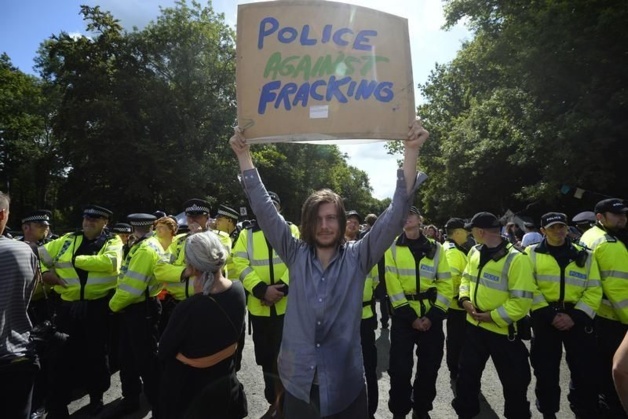
Credits -- Paul Hackett/Reuters
The protest walk against the use of shale gas could still grow in England. Last August, they were already more than 2,000 protesters on the Balcombe site, near Sussex, to demonstrate against fracturing. Even if the drilling is just going through the exploration stage, the British government is planning to start the exploitation stage.
Shale gas in the government's sight
Since 13th December 2012, David Cameron's government has once again authorised drilling exploration of this precious shale gas by hydraulic fracturing. This process consists in injecting chemical products and water under pressure into the ground to break the rock in order to get the gas out. The production was stopped in June 2011 because of earthquakes caused by the exploitation of a site by the British company Cuadrilla, close to Prese Hall.
The resumption of the shale gas exploitation leads to a growing discontentment among the English population. According to a survey published by the University of Nottingham, while English were 61% to support hydraulic fracturing last July, they are only 55% today.
A harrowing ecologic statement
This concern has several origins. Firstly, it is due to an ecological concern, and a will to protect the environment. Since the Cuadrilla Company’s drillings have caused earthquakes, the population is getting more and more worried about the environmental impact this production may cause.
Moreover, last summer’s demonstrations on the Balcombe site might have changed public opinion. Indeed, in August, the inhabitants of Balcombe joined the "Antifracking" movement to protest against the hydraulic fracturing with the slogan: "No Dash for Gas".
Shale gas in the government's sight
Since 13th December 2012, David Cameron's government has once again authorised drilling exploration of this precious shale gas by hydraulic fracturing. This process consists in injecting chemical products and water under pressure into the ground to break the rock in order to get the gas out. The production was stopped in June 2011 because of earthquakes caused by the exploitation of a site by the British company Cuadrilla, close to Prese Hall.
The resumption of the shale gas exploitation leads to a growing discontentment among the English population. According to a survey published by the University of Nottingham, while English were 61% to support hydraulic fracturing last July, they are only 55% today.
A harrowing ecologic statement
This concern has several origins. Firstly, it is due to an ecological concern, and a will to protect the environment. Since the Cuadrilla Company’s drillings have caused earthquakes, the population is getting more and more worried about the environmental impact this production may cause.
Moreover, last summer’s demonstrations on the Balcombe site might have changed public opinion. Indeed, in August, the inhabitants of Balcombe joined the "Antifracking" movement to protest against the hydraulic fracturing with the slogan: "No Dash for Gas".
The economic disillusionment
On top of the environmental concerns is the fracturing cost, which happens to be higher than promised by the Prime Minister in his last declaration of 11 August. The price of the ton of BTU (British Thermal Units) is between 7 and 12 dollars. Close to European markets (10-11 dollars), this price is far from the United States' where the ton can drop to 2 dollars per BTU. Shale gas exploitation will not lead to a rise in the energy bill for the British, but it will not lead to a decrease either, as it’s been the case overseas. This difference is more particularly caused by a higher price of land in the United Kingdom due to the important country's density. Locals are harder to convince than the Americans. Besides, the drilling industry is not well developed. Then, the prices’ variation and the impact on the national supply are really limited.
Finally, the British government announced last July in the 2014 financial law project, economic advantages for this kind of exploitation, which led to a great discontent among the English population. Income taxes on this resource should be only 30%, whereas taxes on conventional northern hydrocarbon are 62%. The industrial lobbies’ question is raised in this fight for exploitation, 2 years before the next elections.
However, according to David Cameron, the British could not afford to miss out on shale gas revolution. Indeed, the government tries to ride this new energy’s wave of success to create employment and growth in a country where traditional resources are falling. During his last conference speech on Wednesday, 9th October, the head of government announced that few plans about shale gas were to be launched. According to him, the United Kingdom has to become “the centre of Europe for the shale gas industry”. The Conservative Minister of Energy, Michael Fallon, also declared on BBC that up to 40 shale gas wells might be opened within the next two years.
Finally, the British government announced last July in the 2014 financial law project, economic advantages for this kind of exploitation, which led to a great discontent among the English population. Income taxes on this resource should be only 30%, whereas taxes on conventional northern hydrocarbon are 62%. The industrial lobbies’ question is raised in this fight for exploitation, 2 years before the next elections.
However, according to David Cameron, the British could not afford to miss out on shale gas revolution. Indeed, the government tries to ride this new energy’s wave of success to create employment and growth in a country where traditional resources are falling. During his last conference speech on Wednesday, 9th October, the head of government announced that few plans about shale gas were to be launched. According to him, the United Kingdom has to become “the centre of Europe for the shale gas industry”. The Conservative Minister of Energy, Michael Fallon, also declared on BBC that up to 40 shale gas wells might be opened within the next two years.



























